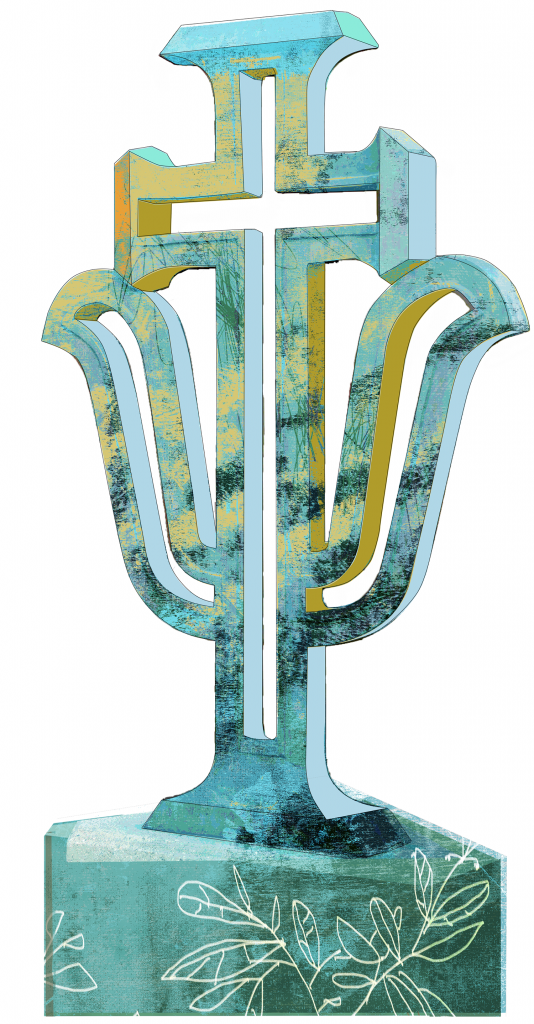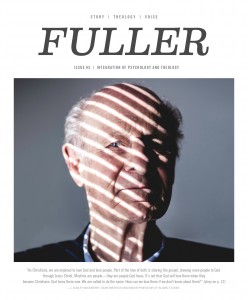 In the courtyard of the building where I teach is a bronze sculpture of a Greek psi combined with a Christian cross. A plaque nearby reads, “Planting the cross in the heart of psychology.” From its beginnings in 1964, the School of Psychology at Fuller has been about this endeavor known as “integration.”
In the courtyard of the building where I teach is a bronze sculpture of a Greek psi combined with a Christian cross. A plaque nearby reads, “Planting the cross in the heart of psychology.” From its beginnings in 1964, the School of Psychology at Fuller has been about this endeavor known as “integration.”
Decades ago, some found it outlandish when Fuller offered the first accredited doctoral program in clinical psychology with a Christian emphasis. Psychology, philosophy, and theology were in fact kindred disciplines until they were unhinged from one another in the late 19th century; the work of what might be called “reintegration” began way back then. Nevertheless, some in the Christian community perceived Fuller’s alliance of psychology and theology as new and possibly dangerous—wondering, as Fuller’s former chair of integration Alvin Dueck references Tertullian, “What does Jerusalem have to do with Athens?”
Over the last half-century critics and naysayers, and there have been many, worried about Fuller’s integration project. Some worried that psychology was a secular science that ignored its philosophical and ethical underpinnings and was at odds with Christian theology. Others worried that our scientific emphasis—with its quantification and logical positivism—would override theology and a Christian faith that could not be measured empirically. Critics’ questions always seem to circle around the same theme: “When psychology and Christian faith are integrated, which trumps the other?”
The Fuller School of Psychology has never approached integration with this adversarial posture. While a number of different integration models have been developed within or alongside Fuller (several are described in the articles that follow), the enduring central commitment of our work has been to bring the best of Christian theology (faith and practice) into honest conversation with the best of psychology (science and practice).
The articles that make up this theology section of FULLER magazine demonstrate that commitment. You will read of science as it is used in the service of developing Christian virtues; how neuroscience does (and does not) inform religious experience; how psychology can equip those in ministerial settings to care for themselves in order to more effectively share and embody the gospel; what Christian faith has to add to the clinical practice of counseling; and even how we can use theology to critique psychology as it plays out in cross-cultural settings. Through it all, one should see that the integrative project is not a debate but a dialogue in which genuine learning, growth, and transformation take place as these two ancient disciplines of study, under the Lordship of Jesus Christ, attempt to serve the kingdom of God.
 En el patio del edificio donde enseño, hay una escultura de bronce de la letra griega psi combinada con una cruz cristiana. Una placa en el lugar dice, “Plantando la cruz en el corazón de la psicología.” Desde sus comienzos en 1964, la Escuela de Psicología de Fuller se ha enfocado en lograr este esfuerzo conocido como “integración.”
En el patio del edificio donde enseño, hay una escultura de bronce de la letra griega psi combinada con una cruz cristiana. Una placa en el lugar dice, “Plantando la cruz en el corazón de la psicología.” Desde sus comienzos en 1964, la Escuela de Psicología de Fuller se ha enfocado en lograr este esfuerzo conocido como “integración.”
Décadas atrás, algunas personas consideraban extravagante que Fuller comenzara a ofrecer el primer programa doctoral acreditado en psicología clínica con énfasis cristiano. La psicología, la filosofía y la teología eran en efecto disciplinas similares hasta que se separaron a fines del siglo diecinueve; el trabajo de lo que podría llamarse “reintegración” comenzó en ese periodo. Sin embargo, algunas personas en la comunidad cristiana percibieron la alianza de Fuller entre la sicología y la teología como algo nuevo y peligroso – preguntándose, tal como el previo presidente de integración de Fuller Alvin Dueck hacía referencia a Tertulian, “¿Qué tiene que ver Jerusalem con Atenas?”
Durante los últimos cincuenta años, personas críticas y negativistas, y han habido muchos y muchas, tenían preocupación sobre el proyecto de integración de Fuller. Algunas personas objetaban que la psicología era una ciencia secular que ignoraba sus puntales filosóficos y éticos y no se condecía con la teología cristiana. Otras personas se preocupaban de que nuestro énfasis científico –con su cuantificación y positivismo lógico– superara a la teología y a una fe cristiana que no pudiera ser medida en forma empírica. Los cuestionamientos de las personas críticas siempre parecían circular alrededor del mismo tema: “Cuando la psicología y la fe cristiana se integren, ¿cuál superará a la otra?”
La Escuela de Psicología de Fuller nunca encaró la integración con esta postura adversa. Mientras que un número de diferentes modelos de integración han sido desarrollados dentro de Fuller (varios son descritos en los artículos que siguen a continuación), el compromiso central permanente de nuestro trabajo ha sido incorporar lo mejor de la teología cristiana (fe y práctica) en un diálogo honesto con lo mejor de la psicología (ciencia y práctica).
Los artículos que conforman esta sección de teología de la revista FULLER demuestran ese compromiso. Podrá leer sobre ciencia y cómo se utiliza en servicio del desarrollo de las virtudes cristianas; cómo la neurociencia informa (o no informa) sobre la experiencia religiosa; cómo la psicología puede ayudar a aquellas personas que sirven con su ministerio para cuidar a su propio ser, a fin de compartir y representar más eficientemente al evangelio; lo que la fe cristiana tiene para aportar a la práctica clínica de la terapia; y hasta cómo podemos utilizar la teología para analizar la psicología en un marco intercultural. A través de todo, se puede ver que el proyecto integrador no es un debate sino un diálogo por el cual se produce un genuino aprendizaje, crecimiento y transformación mientras estas dos antiguas disciplinas de estudio, bajo el Señorío de Jesucristo, intentan servir al Reino de Dios.
 제가 가르치는 건물 안쪽 뜰에는 그리스 문자, psi 의 형태를 십자가와 맞물려 표현해 놓은 동상이 하나 서 있습니다. 동상 앞, 명판에는 “십자가를 심리학의 마음 중심에 으며” 라고 한 짤막한 설명이 붙어 있습니다. 1964년, 개교 이 후, 풀러 신학교내 심리 부는 바로 이 하나됨의 원칙을 구현하기 위한 노력을 멈춘 적이 없습니다.
제가 가르치는 건물 안쪽 뜰에는 그리스 문자, psi 의 형태를 십자가와 맞물려 표현해 놓은 동상이 하나 서 있습니다. 동상 앞, 명판에는 “십자가를 심리학의 마음 중심에 으며” 라고 한 짤막한 설명이 붙어 있습니다. 1964년, 개교 이 후, 풀러 신학교내 심리 부는 바로 이 하나됨의 원칙을 구현하기 위한 노력을 멈춘 적이 없습니다.
수십 년 전, 풀러 신학교에 기독교 정신에 입각한 임상 심리학 박사과정 프로그램이 음으로 생겼을 때에는 의아해 하는 주변의 시선이 없지 않았던 것도 사실입니다. 19 기 후반까지는 심리학, 철학, 신학의 개념을 따로 떼어 생각하는 일이 드물었습니다. 통합을 말하는 현재의 논의도 사실 오래 전에 이미 그 기원이 존재한 셈입니다. 그럼에도 불구하고, 심리학과 신학을 연계하여 이해하고자 하는 풀러 신학교의 움직임에 대해, 몇몇 기독교 커뮤너티의 반응 은 그리 호의적이지만은 않았습니다. 전 심리학 대학 내 통합 (Integration of Psychology and Theology) 의장직에 있었던, Al Dueck 수의 말을 빌리자면, 당시 회의적 태도 는 마치 Tertullian의 질문처럼 “ 아테네와 예 살렘이 무슨 관계가 있단 말입니까?”를 묻는 듯 했습니다.
지난 반세기동안, 풀러 신학교가 펼쳐왔던 심리학과 신학의 통합적 연구를 두고 많은 사람들이 비평하고 반대해 왔습니 다. 어떤 이들은 심리학의 비종교적 성격상, 철학, 및 윤리 적 기준이 적용될 수는 없음을 강조하며, 심리학과 기독교 신학은 상충된 가치를 가질 수밖에 없다고 주장하였습니다. 또 다른쪽에서는 심리학의 과학적 사고방식, 즉 수량적 해석방법과 논리 실증주의 등의 배경이 과학적 실험으로는 측량할 수 없는 기독교 신학의 본체, 그 믿음의 원칙과는 결국 함께 존재할 수 없음을 지적하였습니다. 비평의 목소 리는 다양해도, 저변에 자리한 공통적 질문은 “심리학과 기독교 믿음이 연합될 수 있다면, 과연 둘 중 어느 쪽이 우선인가?”를 항상 물어 왔다고 보여집니다.
풀러의 심리학부는 결코 이러한 회의적 반발감을 가지고 연 합의 주제를 접근하지 않습니다. 여러 형태의 연합의 본보 기가 풀러 신학교 안팎에서 그 윤곽을 드러내 오는 동안, (이에 자세한 소개는 다음 글에 이어집니다.) 그 중심에는 항상, 기독교 신학의 핵심(믿음과 실행)과 심리학의 핵심 (과학과 실행)을 함께 솔직히 이야기할 수 있는 린 대화 의 장을 마련하고자 하는 풀러 신학교의 노력이 있었습니 다.
풀러 매거진 이번호 신학 섹션을 통해 바로 그 대화가 가져올 수 있는 다양한 가능성 을 조명해 보고자 합니다. 이번 호에서는 과학이 어떻게 기독교적 가치관을 형성하고 발달시키는데 사용되는지—어떻게 신경과학이 신앙 경험의 인식을 하게 하는지, 어떻게 심리학이 사역자들을 도와 효과적으로 복음을 선포하게 하는지, 상담치료에 어떤 기독 교 신앙의 부분이 더해 져야 하는지, 그리고 신학을 어떻게 사용하여 통합적으로 사용되어지는 심리학을 비판적으로 성찰 할 수 있는지—를 읽으시게 될 것입니다. 이러한 것들 을 통하여 결국 신학과 심리학의 하나됨이 단지 논쟁의 주 제로 전락되어 버리기에는, 그 연합이 불러올 수 있는 배움 과 성장, 변화의 가능성이 너무 크다는 사 을 아시게 될 것 입니다. 풀러 신학교는 그 가능성을 바라보기에, 오래된 학문의 이 두 기를 붙잡고 그리스도의 인도하심아래 주의 나라를 섬기고자 오늘도 노력하고 있습니다.


